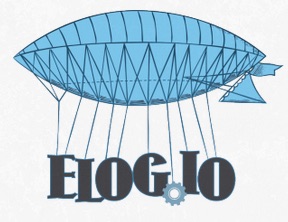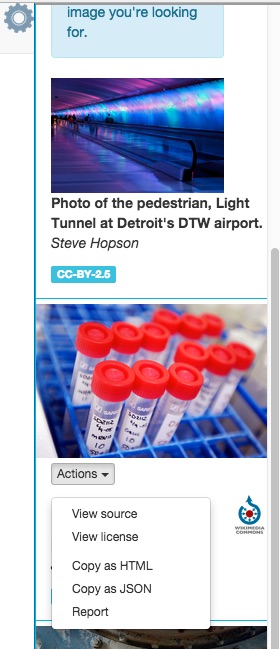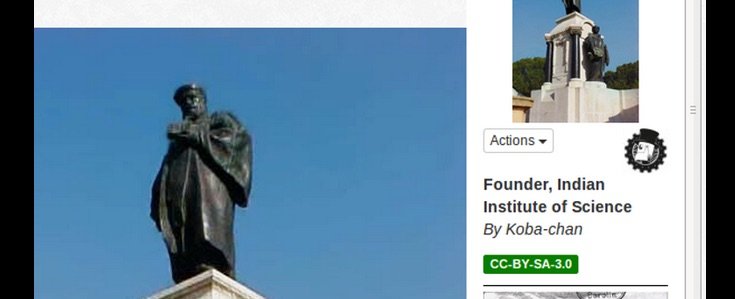Elog.io: Fixing Image Attribution
 It’s no secret that most of the images on the Web are not attributed.
It’s no secret that most of the images on the Web are not attributed.
Sometimes it’s by design, such as stock photos and images used precisely because they don’t require attribution. Other times it’s simple laziness or lack of information, meaning the attribution has long since been lost before the most recent use.
However, Commons Machinery, a Swedish organization dedicated to improving attribution online, hopes to change that. Using a fellowship grant from the Shuttleworth Foundation, the organization has created Elog.io, a search tool that makes it easy to locate attribution information on photographs you find on the Web.
Currently available as extension for Chrome and Firefox, Elog.io basically works by matching the images you see against their database and then allowing you to not only see who created a work, but also embed it, with attribution and license information, into your site or application.
But while Elog.io has just entered public beta, it’s important to remember that this is very much an experiment and that the service has some serious limitations. But, if those limitations can be overcome, Elog.io has a lot of promise to make the world a better place for photographers and other visual artists.
How it Works
 The basics of Elog.io are fairly straightforward. You begin by installing an extension for either Google Chrome or Firefox. Then, a small gear icon appears at the top right corner of every page and stays with you as you surf the Web.
The basics of Elog.io are fairly straightforward. You begin by installing an extension for either Google Chrome or Firefox. Then, a small gear icon appears at the top right corner of every page and stays with you as you surf the Web.
When you become curious about the owner of a particular image, simply click the icon to reveal all of the images found on the page. You then click the image and the “Query” button to search the Elog.io database to see if the image can be found.
If you are able to find the image, Elog.io then gives you a series of options, including viewing the source, viewing the license and copying the information in either JSON or HTML. However, the HTML copy, in my testing using Google Chrome, only copied a plain text version of the attribution and license information, not actual HTML to embed the image.
While it’s definitely a simple to use plugin, it’s also true that such a plugin is only as good as its matching. Unfortunately, that is where Elog.io’s biggest limitation currently rests.
The Current Limitations
In my testing, Elog.io’s matching seemed to work well enough. Whenever I fed it an image that it knew, it seemed to recognize it though, on occasion, it reported a perfect match as a “close” match. The site also warns that it works best with verbatim use, meaning that changes to the image can thwart its matching.
However, the problem of detecting altered images is already a solved problem. Tineye, Google Image Search, PicScout, Plaghunter, ImageRights and others can all detect images that have been edited, often heavily.
But the biggest limitation is the size of Elog.io’s library. Currently, Elog.io only has Wikimedia Commons indexed. While that means it has over 22 million images in its index, that’s only a drop in the bucket compared to billions of images contained in Tineye, which in turn is dwarfed by Google.
There are just too many photos out there for Elog.io to reliably find the image you want. Facebook, for example, has over 250 billion photos by itself and, despite a multitude of tests, I wasn’t able to find a single photo on my Facebook feed in Elog.io.
Simply put, though Wikimedia Commons is a great resource for open-licensed images, it makes up a very small percentage of the Web and is not a popular resource for other sites and users to pull from.
In short, if you install the extension, don’t expect to magically get attribution for most or even many of the images you encounter on the Web.
There are also some other UI issues with the plugin. For one, requiring two clicks to check an image slowed down the process a great deal and there were several times it would hang in the middle of the query, never returning a response. Also, the gear icon simply lays on top of whatever is in the upper right hand corner of the page, which might be something important on some sites.
However, those issues are minor compared to the above limitations and also the potential of this idea.
Looking Ahead
To be fair, the limitations of Elog.io should be expected. Elog.io is, at this juncture, a beta test and an early one at that. It’s going to be limited.
The big dream of Elog.io is that, with more libraries indexed and use of its API to integrate it into different applications, that image attribution can become ubiquitous and something that few people think about.
Imagine, for a second, integrating Elog.io into photo editors like Photoshop or graphic design programs like Indesign. Commons Machinery has already been involved with some of that, integrating some of its other work into different applications, however, there is a lot of potential to expand.
But the challenge that Elog.io faces isn’t technological. Back in 2009 PicScout launched a similar extension entitled ImageExchange. But, where Elog.io works with open licensed images in Wikimedia Commons, ImageExchange worked with images sold by stock photo agencies.
ImageExchange, in many ways, had better technology. It had more flexible matching and was “set and forget”, automatically analyzing results in Google Image Search. However, ImageExchange is now defunct, having been abandoned by its parent.
What Elog.io needs to overcome is the database and access issue. It needs to partner with major sites like Facebook, Flickr, Imgur, stock photo companies, etc. to help match all images, not just those licensed under open license terms.
Getting the access to the images and then expanding their operation to handle the increase in database size and load will be the bigger long term challenge.
Elog.io won’t be widely used if it can’t detect a decent percentage of images. While the tech it’s built to do that is funcational, it won’t mean much unless they have the database to feed it.
Bottom Line
I know that this write up sounds very negative, but I’m actually very excited and hopeful about Elog.io and what it’s trying to do. I would love to see photographers be better attributed for their work and technology, such as Elog.io, is likely the best approach at this time.
However, this is a problem that many others have approached from a similar angle and have failed at, mostly due to the same challenges Elog.io is facing already. I’m hoping that Elog.io will be the exception and I think it’s idea of crowdfunding its next phase, is a brilliant move.
But unless it cam overcome the obstacles in its way, it will be just an interesting experiment that never gained much traction or recognition.
The path to reach change is long and uphill, but here’s hoping that Elog.io can make the climb.
Want to Reuse or Republish this Content?
If you want to feature this article in your site, classroom or elsewhere, just let us know! We usually grant permission within 24 hours.
